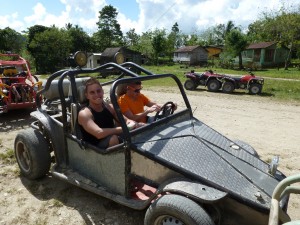“The use of traveling is to regulate imagination by reality, and instead of thinking how things may be, to see them as they really are.” — Samuel Johnson
I’ve been on all sorts of trips the past five years. I’ve done road trips, beach vacations (many of them), and backpacking alone through Europe. I’ve come to a simple conclusion over the past half of a decade.
There’s nothing like travelling the world in your 20s.
I just got back from Puerto Plata, Dominican Republic and I loved it. It’s impossible to not have a great time when you’re avoiding the Canadian winter in a tropical paradise where you can eat and drink all that you want. A tropical vacation isn’t as exciting as showing up in a foreign country and trying to figure everything out on your own. However, it’s all a good time to me. I’ll take any opportunity to get out of town.
“A journey is best measured in friends, rather than miles.” – Tim Cahill.

I wanted to share some general travels tips that I’ve picked up from reading various books, blog posts, and through the experience of going on dozens of trips. This brief overview will show you how to travel without being a complete tool.
Bring half of the stuff and more money.
I’ve seen friends over pack to the max on trips before. Most of us can be guilty at some point of bringing too much on a trip. I’ll never forget this one family that I met at the airport in Punta Cana. The husband was scolding his wife because they had to pay extra since she brought an additional piece of luggage. Her justification was that she didn’t know when she would need a certain piece of clothing.
“I can’t emphasize enough how important it is to travel light. Dragging an enormous pack full of junk from place to place is the surest way to hamstring your flexibility and turn your travels into a ridiculous, grunting charade.” — Rolf Potts
My best tip is to bring less stuff and more money just in case. If you really need something (chances are you won’t), you can always pick it up. This isn’t the 1950s. You can find anything that you need away from home.
Watch where you convert your money.
Believe it or not, you can lose a ton of money on exchange rates. The value of currency that you see on the news is never going to be what you actually get. I’ve learned this the hard way with the Canadian dollar. The dollar here has risen past the U.S dollar and still many foreign countries don’t even acknowledge this. I ended up losing money many times by having to convert Canadian to American and then to the local currency.
Every time you convert money someone takes a chunk of it and you don’t get the real rate. I would recommend doing your research on exchange rates ahead of time so that you don’t get screw over on the currency conversion.
You can negotiate everything.
In North America we don’t barter because most prices are final. You can’t just walk into Walmart and start negotiating the price of a pair of shoes. When you travel you’ll quickly find that you can negotiate everything. Most prices aren’t final. You can ask for a discount or simply barter.
You have nothing to lose from bartering. If you never ask, the answer is always no. This is also why it helps to sometimes carry around cash instead of your credit card.
Money talks.
To tie into the previous point of negotiating, money really talks in most third world countries. In my experiences a tip or a bribe can go a far way. Now before you get appalled, you must understand that bribes are customary in many countries. You try giving a cop a handout in North America and you’ll regret it for the rest of your life. In other parts of the world, it’s perfectly normal.
A simple tip can go a long way when checking into a hotel in most foreign places. For example, in Puerto Plata, we tipped the front desk clerk a few bucks and we got upgraded to a junior suite. In North America, a tip is either expected or barely appreciated. In other parts of the world money talks and can take you a long way.
Those are some basic travel tips that will help you not look like a complete tool when you leave home and travel a bit. If you’re still interested in more, you can read on about traveling the world after college.